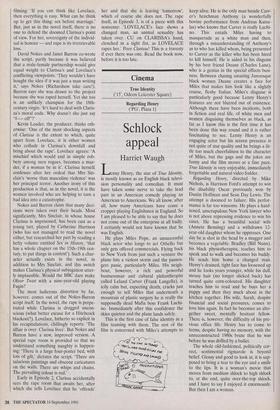Cinema
True Identity (`15', Odeon Leicester Square)
Schlock appeal
Harriet Waugh
Lenny Henry, the star of True Identity, is mostly known as an English black televi- sion personality and comedian. It must have taken some nerve to take the lead part in an American comedy playing an American to Americans. We all know, after all, how many Americans have come a cropper playing Englishmen in England. So I am pleased to be able to say that he does not come out of the enterprise at all badly. I certainly would not have known that he was English.
He plays Miles Pope, an unsuccessful black actor who longs to act Othello but only gets offered commercials. Flying back to New York from just such a venture the plane hits a violent storm and the passen- gers panic, particularly Miles. His neigh- bour, however, a rich and powerful businessman and cultural philanthropist called Leland. Carver (Frank Lange11a), is icily calm but, expecting death, cracks just enough to tell Miles that underneath a mountain of plastic surgery he is really the supposedly dead Mafia boss Frank Luchi- no. Immediately after this confidence the skies quieten and the plane lands safely.
This is the first case of false identity in a film teaming with them. The rest of the film is concerned with Miles's attempts to keep alive. He is the only man beside Carv- er's henchman Anthony (a wonderfully bovine performance from Andreas Katsu- las) who knows that Carver is really Luchi- no. This entails Miles having to masquerade as a white man and then, through a misunderstanding of Anthony's as to who has killed whom, being presented to Carver as the killer who has been hired to kill himself. He is aided in his disguise by his best friend Duane (Charles Lane), who is a genius in the special effects busi- ness. Between chasing amazing Junoesque black women Duane creates a face for Miles that makes him look like a slightly coarse, fleshy Italian. Miles's disguise is particularly good because Lenny Henry's features are not blurred out of existence. Although there have been incidents, both in fiction and real life, of white men and women disguising themselves as black, as far as I know this is the first time it has been done this way round and it is rather fascinating to see. Lenny Henry is an engaging actor but his screen presence is not quite of star quality and he brings a lit- tle too much cheerfulness to the character of Miles, but the gags and the jokes are funny and the film moves at a fine pace. True Identity is very enjoyable, immediately forgettable and natural video fodder.
Regarding Henry, directed by Mike Nichols, is Harrison Ford's attempt to win the disability Oscar previously won by Dustin Hoffman and Sean Day Lewis. The attempt is doomed to failure. His perfor- mance is far too winsome. He plays a hard- nosed, unscrupulous New York lawyer who is not above repressing evidence to win his cases. He has a beautiful social wife (Annete Benning) and a withdrawn 12- year-old daughter whom he oppresses. One day he is shot in the head by a mugger and becomes a vegetable. Bradley (Bill Nunn), his black physiotherapist, teaches him to speak and to walk and becomes his buddy. He sends him home a changed man. Henry's drained, tight face has loosened up and he looks years younger, while his dull, mousy hair (no longer slicked back) has turned quite corn-coloured. His daughter teaches him to read and he buys her a puppy and then they muck about in the kitchen together. His wife, Sarah, despite financial and social pressures, comes to love him again. In fact he becomes an alto- gether sweet, mentally hesitant fellow. There is, however, the difficulty of his pre- vious office life. Henry has to come to terms, despite having no memory, with the unreconstructed 1980s brute that he was before he was drilled by a bullet.
The whole old-fashioned, politically cor- rect, sentimental rigmarole is beyond belief. Glossy and good to look at, it is sup- posed to bring a tear to the eye and a smile to the lips. It is a woman's movie that moves from medium shlock to high shlock to, at the end, quite over-the-top shlock, and I have to say I enjoyed it enormously. But then I am a woman.


















































 Previous page
Previous page